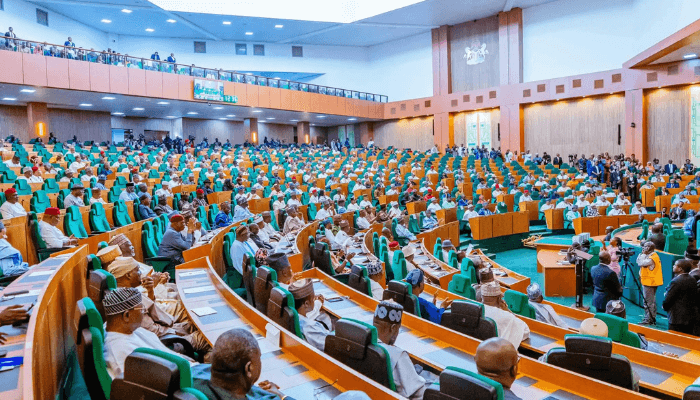APC’s big win in the House: How two-thirds majority changes the political chessboard
Nigeria’s ruling All Progressives Congress (APC) has just pulled off a quiet but major political victory, locking down a two-thirds majority in the House of Representatives.
It happened almost casually on Thursday when six lawmakers from the opposition crossed over to the ruling party during plenary. But beneath the formal letters of defection and big welcomes is a significant move in the parliament’s political chessboard.
Five of the defectors came from the Peoples Democratic Party (PDP), all from Enugu State, while one, Daniel Asama, from Plateau, came from the Labour Party (LP). Tajudeen Abbas, Speaker of the House, read their letters one by one, as Nentawe Yilwatda, the APC National Chairman and Peter Mbah, Enugu State Governor, both seated in the chamber, looked on with pride.
With this latest wave, the APC now boasts at least 242 members out of 360 in the House. That’s comfortably past the two-thirds line of 240. The PDP, once the dominant force, is now down to 74 members, while the other smaller parties; LP, NNPP, APGA, SDP and YPP share about 43 seats.
In everyday terms, this means the APC now has enough lawmakers to push through most legislative decisions without needing help from the opposition. That’s significant political power. It gives the party control not just of debates but also of constitutional amendments and budget approvals.
The lawmakers who switched sides pointed to what they called “prolonged internal crises and unresolved leadership disputes” within their former parties. Some blamed deepening factions, others said they were simply following the wishes of their constituents who advised them to join the ruling party for “more effective representation.”
Chidi Obetta, one of the defectors from Enugu and formerly Deputy Chairman of the House Committee on Legislative Budget and Research, didn’t mince words. He said the PDP’s endless leadership squabbles had paralysed it both nationally and in Enugu State. “The party has lost focus and cohesion,” he said, adding that staying in it no longer made sense politically.
The APC leadership, naturally, welcomed the new arrivals with open arms. Abbas congratulated them, while Yilwatda and Mbah described the APC as “the most progressive political family in Africa.” The mood in the chamber was almost celebratory.
Interestingly, this development comes just days after the APC secured a two-thirds majority in the Senate as well. Senator Samaila Kaila’s defection from the PDP gave the party 73 seats in the 109-member upper chamber. Like his colleagues in the House, Kaila blamed “recurring factionalisation and loss of direction” in the PDP.
Taken together, the APC now effectively dominates both arms of the National Assembly, a position that makes it easier for President Bola Tinubu’s administration to push through key policies and legislative reforms.
With a more cooperative parliament, Tinubu can expect fewer roadblocks in pushing through economic bills and reforms that might have previously faced stiff resistance.
Still, not everyone is cheering. Political watchers warn that too much power in one party’s hands could weaken Nigeria’s fragile checks and balances.
Innocent Okechukwu, a political observer, said the development sounds good for stability, but it can also silence opposition voices. “Democracy needs debate, not domination”, he said.
Nigeria’s history shows that when the ruling party controls everything, the presidency, the Senate, and the House, the lines between oversight and obedience can blur.
Parliament’s role as a check on the executive often fades, replaced by a culture of rubber-stamping government proposals. There’s also the question of loyalty. Nigerian politics has never been short on party switching. Defections often happen less because of ideological alignment and more because of where power and influence lie.
The Constitution frowns on it, except where there’s a “division” in a party,a term many politicians interpret loosely. So, when lawmakers say there are “crises” or “factions” in their parties, it’s often a legal way to justify their move.
In Enugu, where most of the latest defectors came from, the defections mirror Governor Mbah’s own political journey. Mbah, who was elected under the PDP, recently joined the APC himself, a move that likely made it easier for federal lawmakers from his state to follow suit. The message seems clear: in Nigeria’s politics, it often pays to move with the tide.
For the opposition, this is a tough moment. The PDP, already struggling to define its direction after losing the 2023 presidential election, now faces a shrinking presence in parliament. The Labour Party, which surged during the last election cycle, is also battling internal divisions and leadership tussles in several states.
For the APC, on the other hand, it’s a strategic win that tightens its control of the political narrative. With both chambers now firmly under its influence, the party is better positioned to dictate the pace of governance, set the legislative agenda, and if it wants, even amend the constitution without much opposition.
Whether that translates to better governance is another question. Nigerians have seen dominant parties before, and power doesn’t always mean progress. The real test will be whether the APC uses this new strength to deliver on its promises, or simply to entrench its hold on power.

